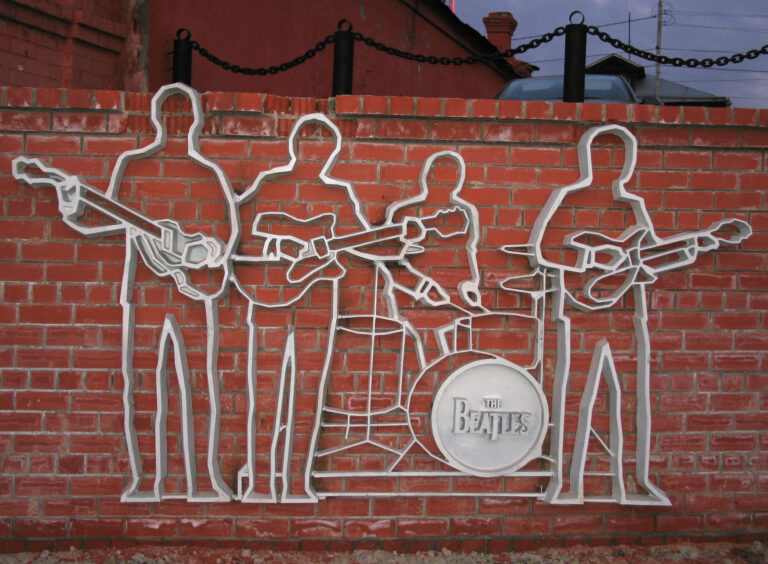The Beatles have once again left an indelible mark on music history, despite the fact that a lot of time has passed since the band members left for separate individual paths. This time, the iconic group resurfaced through the power of artificial intelligence. Their 2023 release, Now and Then, a track initially recorded as a rough demo by John Lennon in the late 1970s, has won the Grammy Award for Best Rock Performance.

The Beatles – artistic impression. Image credit: yachmenev via Flickr, CC BY 2.0 license
This recognition has just become not only the band’s eighth Grammy win but also the first time a song created with AI-assisted technology has received such a prestigious music industry award.
How AI Helped Restore John Lennon’s Voice
For years, Now and Then remained unfinished due to the poor audio quality of Lennon’s original demo. The limitations of analog technology at the time meant that separating his vocals from the noisy piano accompaniment was impossible, or at least not possible using conventional technological measures of the time. However, a breakthrough came in 2021 when filmmaker Peter Jackson and his team, who previously worked on The Beatles: Get Back documentary, decided to experiment with a new machine-learning-based audio restoration technique.
This technology, known as stem separation, employs advanced AI algorithms to isolate individual elements within a mixed audio track. In the case of Now and Then, AI extracted Lennon’s voice with unprecedented clarity, allowing Paul McCartney and Ringo Starr to complete the song while maintaining the authenticity of the band’s original sound.
Unlike generative AI models that simply mimic an artist’s musical style to create ‘entirely new’ compositions, this AI-assisted technology does not fabricate new elements but rather is used to enhance existing material with the utmost precision and care, at the level which is hardly attainable for human producers.
More AI Controversy in Music? Not Quite That
The use of artificial intelligence in Now and Then initially sparked debate among fans and industry experts.
Some feared that the technology might have been used to deepfake Lennon’s voice, generating synthetic vocals rather than preserving the integrity of his original performance. However, McCartney was quick to dispel these concerns, stating, “To be clear, nothing has been artificially or synthetically created. It’s all real and we all play on it. We cleaned up some existing recordings—a process which has gone on for years.”
This distinction is very important, especially in an era where AI-generated content is becoming increasingly dominating. Unlike controversial AI-mimicked tracks—such as Ghostwriter’s Heart on My Sleeve, which attempted to replicate the voices of Drake and The Weeknd without consent—Now and Then represents a respectful application of AI, one that preserves an artist’s true voice rather than replacing it.
The success of Now and Then is just the first step. The role of AI in the music industry is growing, particularly in archival restoration. AI-powered stem separation is already used to remaster old recordings. Now, it is possible to retrieve vocals, instruments, and effects from degraded tapes that were previously deemed unusable.
This technique has already been employed beyond The Beatles’ catalog, as recently seen in the restoration of Ol’ Dirty Bastard’s vocals for SZA’s track Forgiveless. Similarly, Disney Music Group has partnered with AudioShake to revitalize classic soundtracks, offering fans enhanced listening experiences through improved audio clarity.
AI Beyond Music: Reviving Creative Artifacts
AI’s impact extends far beyond music. Artificial intelligence tools can be used in restoring and preserving various forms of creative works. In film, AI is being used to enhance lost footage, colorize black-and-white films, and improve old dialogue audio. Classic movies such as Casablanca and Lawrence of Arabia have undergone high-definition restoration thanks to AI-driven upscaling techniques.
In the literary world, AI-driven OCR (Optical Character Recognition) and natural language processing (NLP) are helping to digitize and restore ancient manuscripts, allowing historians to recover lost texts that were once thought to be illegible due to age and damage. Similar applications can be seen in the fine arts, where AI is used to reconstruct damaged paintings and analyze brushstroke patterns to authenticate lost masterpieces.
The Grammy win for Now and Then is an obvious acceptance of AI-assisted technology in mainstream music production. The Recording Academy has been adapting to the new reality where AI is already an inseparable element in music production. Therefore, this award, in a certain sense, sets guidelines for Grammy eligibility that ensure AI does not overshadow human creativity. Moving forward, artists, labels, and tech developers will need to strike a balance between the use of AI as a powerful restoration tool and maintaining ethical boundaries in content creation.
Hopefully, with new developments in AI, particularly in music and other creative fields, its role will remain more as a preserver rather than a creator. Although, this delicate balance will remain a key point of discussion. While Now and Then proves that AI can breathe new life into lost recordings, its use must always prioritize artistic integrity over artificial innovation.
If you are interested in this topic, we suggest you check our articles:
